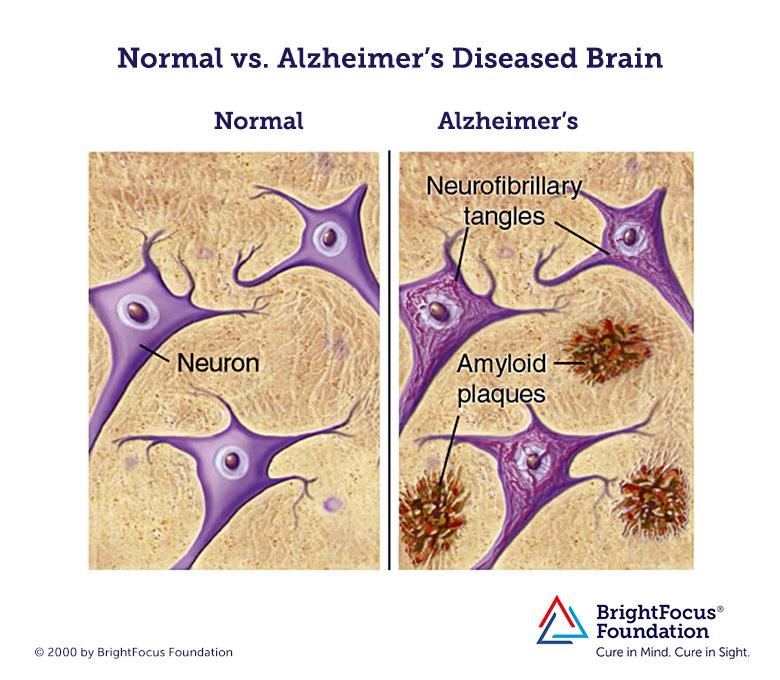The finding of several clinical studies. And reports indicate that drinking coffee could have beneficial effects on Alzheimer’s disease (AD). Coffee Prevention of Alzheimer’s is not fully studied, but the beneficial effects have been noted. The benefits appear to come from caffeinated coffee. But not decaffeinated coffee or pure caffeine itself. On the other hand, raw caffeine is effective. Therefore, I’ll try to weed out myth from fact, with the realization that further study is needed.
Coffee Prevention of Alzheimer’s Decreases Plaques in the Brain
According to Sauer, a new research study shows that coffee may prevent the onset of Alzheimer’s disease by reducing the amount of beta-amyloid in the brain. Prior to this study, it was undetermined why coffee affected Alzheimer’s in a positive way. But its effects on reducing beta-amyloid have shown coffee to affect Alzheimer’s by as much as 50%. So, these beta-amyloid plaques interfere with normal brain function, causing dementia, usually in the form of Alzheimer’s disease. Consequently, women over the age of 65 who drank more coffee with caffeine had a lower risk of developing cognitive impairment, or Alzheimer’s and dementia.
Diseased Brain

Decaffeination Decreases Effectiveness
The studies show that the process of decaffeination also reduces the number of metabolites (substances that your body metabolizes or uses). Consequently, one or more of these substances that decrease Alzheimer’s plaques in the brain are missing in decaffeinated coffee. So, if you want coffee to decrease the development of these plaques, you need to use regular coffee and drink about 2-3 cups per day. It will not cure Alzheimer’s. But coffee is used as a natural preventative measure to decrease your chances of developing Alzheimer’s.
Coffee Prevention of Alzheimer’s
According to Chang and Ho, there is growing epidemiological evidence that supports the treatment roles of drinking coffee in the prevention of Alzheimer’s disease (AD). Hence, in a 21 years study with follow-up, people who drank 3–5 cups of coffee per day during midlife had a 65% reduction in the risk of developing Alzheimer’s. This was as compared to those who drank little or no coffee. Again, this is regular coffee, not decaf. Also, the study reported that administration of crude caffeine. But not pure caffeine, reduced amyloid burden, improved antioxidant activity and enhanced glucose uptake in Alzheimer’s Disease mouse model. So, refined caffeine is stripped of its protective stuff. But raw caffeine – like in coffee, has the protective stuff.
Energy Drinks are No Substitute
Due to the fact that refined caffeine does not have the same protective effects, they are not good substitutes for coffee. So, energy drinks that derive their caffeine from purified caffeine will not reduce the plaque development in Alzheimer’s. Caffeine from tea, green tea, and green coffee are also good substitutes for regular coffee. The unroasted green coffee has a higher percentage of these good substances. Also, the lighter the coffee roast the healthier it is. Other raw natural sources of caffeine are effective too. But again, we need more research. Avoid energy drinks, due to their inability to help with preventing Alzheimer’s and their excessive sugar content.

Rat Study for Coffee Prevention of Alzheimer’s
According to a Rat study for Coffee Prevention of Alzheimer’s performed by Basurto-Islas, et.al. the rats also showed a positive effect of a specific coffee substance. They made rats specifically to develop Alzheimer’s. In the study, they found a minor component of coffee that is not an attribute fo caffeine, eicosanoid-5-hydroxytryptamine (EHT). This EHT provides protection for the rats in this study for Alzheimer’s disease. Since this substance (EHT) is present in coffee, but not related to caffeine, it may be why raw caffeine was effective, but purified caffeine was not. Rat pups were injected with ICV on the day of birth to start the development of Alzheimer’s. Then they were fed rat chow with one group getting 0.1% EHT in their diet. And the other group without EHT. So, the rats fed the EHT had much less cognitive problems as they grew older.
Coffee Prevention of Alzheimer’s Needs Further Study
According to Larsson and Orsini, there is also evidence from observational studies that indicate that coffee consumption will lower the risk of several diseases. These include diabetes, stroke, coronary heart disease, certain cancers, Parkinson’s disease, and gout. These are in addition to coffee’s benefits for Alzheimer’s. Additional studies have shown coffee protects against dysfunction in the blood-brain barrier and also prevents memory impairment. But not all the studies have shown these positive effects of coffee. Additional studies should occur to confirm the health benefits of coffee.
Coffee Prevention of Alzheimer’s “An Ounce of Prevention is Worth a Pound of Cure”
The vast majority of the research points to the amazing effects of coffee to prevent Alzheimer’s. Hence, few have disputed this and even though more study is needed, who cares! It’s coffee! The most consumed beverage on the planet. And for good reason. It’s wonderful, delicious and also has great health benefits. There is no reason to not drink coffee, except for a few medical problems. Always consult your physician when in doubt. For everyone else, drink up and live healthier and also decrease your chances of developing dementia and Alzheimer’s. You can’t lose! You can only Win with this delicious beverage – Coffee!
Coffee!

References
- Basurto-Islas, G., & Et. al. (2014, June 17). Therapeutic benefits of a component of coffee in a rat model of Alzheimer’s disease.
- Chang, K., & Ho, P. (2014, August 6). Gas Chromatography Time-Of-Flight Mass Spectrometry (GC-TOF-MS)-Based Metabolomics for Comparison of Caffeinated and Decaffeinated Coffee and Its Implications for Alzheimer’s Disease.
- Larsson, S., & Orsini, N. (2018, October 14). Coffee Consumption and Risk of Dementia and Alzheimer’s Disease: A Dose-Response Meta-Analysis of Prospective Studies.
- Sauer, A. (2016, December 29). Does Coffee Prevent Alzheimer’s?
- Sauer, A. (2017, January 3). 4 Surprising benefits of coffee.
To learn more about a wonderful coffee that helps you lose weight, follow the provided Coffee Link.


